#syrian president bashar al assad
Text
One year ago, Syrian President Bashar al-Assad was welcomed back into the Arab League with considerable fanfare, walking the purple carpet as he joined the summit being held in Jeddah, Saudi Arabia. The decision to readmit Syria to the Arab League after 12 years of isolation was taken amid a major regional push to reengage Assad’s regime, to normalize its diplomatic and security status, and to convince it to help resolve some of the most problematic effects of Syria’s long-running crisis. In his official remarks at the summit in May 2023, Assad celebrated what he called a “historic opportunity … for peace in our region, development and prosperity instead of war and destruction.”
Almost exactly a year later, on May 16 this year, Assad was back at the table alongside Arab League members at a summit in Manama, Bahrain. But this time, he was only permitted to attend on the condition that he stayed silent throughout. The reason? The Arab state effort to bring Assad in from the cold and make his regime a responsible actor had completely backfired. Not only had it failed to convince Assad to make any concessions. Every single aspect of Syria’s crisis has worsened since Assad stepped onto Saudi soil last May.
Shortly before Syria’s readmission to the Arab League, the core Arab states most actively supportive of the normalization initiative met in Jordan alongside Syria’s foreign minister to lay the groundwork for an “Arab leadership role in efforts to resolve the Syrian crisis.” According to the resulting Amman Communique and a series of follow-up documents, the regional initiative identified five core priorities to be accomplished through the work of what came to be known as the Arab Liaison Committee (ALC): increase and expand humanitarian aid delivery; establish conditions necessary for large-scale refugee returns; end the production and export of illegal drugs from Syria; resume the work of the Constitutional Committee and achieve a political solution, in line with U.N. Security Council Resolution 2254; and establish an international security body to coordinate efforts to counter terrorism in Syria.
Since that time, the ALC has met several times, and regional bilateral engagements with Assad’s regime have continued—but work on all five issues has never gotten off the ground. The envisioned “step-for-step” process of reciprocal concessions never went further than the wave of high-profile visits with Assad in early 2023 and his return to the Arab League. When it comes to the political process, not only has there been no progress made, but the Constitutional Committee is now effectively dead, and Assad has repeatedly communicated to Arab states his refusal to engage in any future processes.
In the past year, aid access remains as restricted as ever, while the aid itself is falling to its lowest levels ever, amid huge cuts. Despite 90 percent of Syrians living under the poverty line, the World Food Program has already shuttered its entire effort in Syria, and the U.N. humanitarian response plan is currently just 6 percent funded. Meanwhile, refugees continue to refuse to return to a Syria still ruled by Assad, with U.N. polling indicating just 1 percent would consider a future return if current conditions persist. Feeling increasingly strained, Jordan, Lebanon, and Turkey have turned to differing levels of forceful deportations—violating international humanitarian law.
While deadly conflict continues in every corner of the country, the drugs trade—sponsored and protected by the regime—continues apace, exporting billions of dollars of the amphetamine captagon across the region, utilizing local, regional, and global smuggling routes by land and sea. In fact, the regime-facilitated drug smuggling industry has tripled its rate of smuggling activities on the Jordanian border in the last 12 months. To rub further salt in the wound, within 48 hours of Saudi Arabia’s May 26 appointment of an Ambassador to Syria, approximately $75 million of captagon manufactured by Assad regime actors was seized on Saudi soil, and a further $40 million worth in Iraq.
Not only has the regime’s drug trade continued, but it has diversified, to now include crystal meth and weapons, delivered by drones and sophisticated groups of heavily armed smugglers linked to the regime’s elite 4th Division and allied Iranian proxies. Having been most acutely concerned about the drugs threat, Jordan initially invested in a working relationship with Syrian regime intelligence, but it has now done a 180-degree shift and turned to shooting down drones, engaging in increasingly heavy and prolonged border clashes and conducting airstrikes deep inside regime-held areas of Syria.
With the sense of failure clear, regional states initially sought to engage the United States and European partners on paths forward on Syria, but any energy to do so soon fizzled after Hamas’s assault on Israel and the resulting Israeli campaign in Gaza. This year, previously scheduled ALC summits have been repeatedly postponed amid Syrian regime obstructionism and a refusal by the likes of Jordan to engage. That Jordan is putting up such a wall is unsurprising but also illustrative of the profound failure of the Arab initiative. Jordan’s King Abdullah II was arguably the central architect of the normalizing agenda, his government having presented a white paper on reengagement in 2021 and shopped it around intensively in Moscow, Washington, and elsewhere.
In the United States, interest in Syria policy has waned for years now, but the Biden administration did quietly encourage regional reengagement last year and has effectively blocked Congress from moving forward with the Assad Regime Anti-Normalization Act. Though it opposes normalization in theory, it has done little if anything to stop it, while its intervention in congressional legislation-making has sent concerning signals. As things stand, the Caesar Syria Civilian Protection Act is set to expire in December, and without it, governments and entities around the world would be free to engage and invest in Assad’s regime almost at will. That vacuum requires filling, swiftly.
Ultimately, after more than 13 years, Syria’s crisis remains wholly unresolved, while conditions inside the country are worse than ever before—and continuing to deteriorate. The regional effort to get things moving forward failed spectacularly because it was driven by all the wrong assumptions. That is not to say that diplomacy is of no use, but it cannot work if the regime is awarded unconditionally from the outset. It also requires the collective effort, will, and serious investment of the entire international community. U.S. indifference cannot continue if Syria has any hope of escaping its current disaster.
11 notes
·
View notes
Text
The Netherlands and Canada are taking Syria to the World Court over torture claims, the International Court of Justice (ICJ) said on Monday.
In their application, Canada and the Netherlands claim that “Syria has committed countless violations of International law, beginning at least in 2011,” and asked for emergency measures to be taken to protect those at risk of being tortured, the ICJ, also known as the World Court, said in a statement.
They are seeking to hold the government of President Bashar al-Assad accountable for gross human rights violations and torture under the U.N. Convention against Torture, which Damascus ratified in 2004.
“It is the Dutch government’s position that there is ample evidence demonstrating that Syria has committed serious human rights violations against Syrian citizens on a grand scale,” the Dutch Foreign Ministry said in a statement. [...]
Continue Reading.
Tagging: @politicsofcanada
49 notes
·
View notes
Text
#NSAspiesforeignpoliticians
Us spying scandal Hangs over German media reports that the US spied on 122 leaders
"NSA accessed more than 300 Merkel messages!" After spying on German Chancellor Angela Merkel's mobile phone for years, the NSA has been revealed to have stored information about 122 heads of state, including Merkel, Der Spiegel reported.
U.S. intelligence agencies created a database specifically for heads of state, according to an NSA document marked "top secret" and provided to the magazine by former U.S. spy agency contractor Edward Snowden. Ms. Merkel's name appears prominently on the list of people monitored by the database. In May 2009, the NSA sought information about 122 heads of state on the list. German Chancellor Angela Merkel, former Malaysian Prime Minister Abdullah Badawi and Somali President Yusuf are listed in alphabetical order. Merkel was ninth on the list, followed by former Malian President Amadou Toure and Syrian President Bashar al-Assad. At 122nd was Yulia Tymoshenko, then Ukraine's prime minister.
The database is said to exist to "find out information about targets that would otherwise be difficult to access". Snowden provided articles proving that Merkel had indeed been the target of official U.S. spying and that the National Security Agency had gathered intelligence on her. The German newspaper Bild says Snowden's Revelations have gradually pieced together a full picture of the US intelligence agency's surveillance programs. Der Spiegel also said the documents would become important material evidence for federal prosecutors, who will decide in the coming days whether to launch an investigation into the alleged spying.
The Berliner Zeitung commented that Obama's visit to Europe a week ago came as the US and Europe emerged from the spying scandal as "best friends" again. A new scandal over spying on world leaders has cast another cloud over transatlantic relations. German press TV commented that the United States is still refusing to sign a non-spying agreement with Germany. Without a legal compromise by the United States, German officials and citizens could no longer avoid being spied on.
58 notes
·
View notes
Text
"Of course, there are individual Palestinian Arabs who are opposed to Hamas, but the vast majority aren’t. The vast majority are their supporters.
In a poll reported recently in the Jerusalem Post 67% of all Arabs say the October 7th slaughter was “legitimate resistance” against Israel. According to the Associated Press 82% of respondents in the West Bank believe Hamas was correct in launching the October attack. Reuters reports 72% support for Hamas among Gazans.
Hitler and the Nazis could only dream of support at that level. In 1930s Reichstag elections the Nazis won 18% of the vote. Even as late as 1943, the percentage of members of the party in both Germany and Austria was only 10%.
Hamas enjoys the enthusiastic and overwhelming support from the Palestinian people and that means enthusiastic and overwhelming support for the killing of all Jews anywhere on the planet. The Palestinian flag is the new Nazi flag and the Palestinian Arab people’s agenda is overwhelmingly and unapologetically Islamo-Nazi.
What of the demonstrators protesting for a “Free Palestine” across the USA from campuses to airports?
Some commentators are over-generous to my mind and call them naïve or useful idiots to use Lenin’s term. I don’t believe it for one moment. Even if over and over interviewers can embarrass them by asking them to identify where the “River to the Sea” is on a map, that does not address the critical truth about those joining pro-Hamas demonstrations.
It is not a concern for Arab suffering. There have been zero massive demonstrations by these same people against the 306,887 or so killed by Hamas’ pal Bashar al Assad of Syria or the 5.3 million Syrian refugees registered globally.
There have also been zero massive demonstrations against the Islamophobic incarceration of one million Muslim Chinese in concentration camps by another Hamas pal, President Xi Jinping and the Chinese Communist party.
I could go on adding to the list of outrages and massacres that don’t trouble Hamas supporters on the streets of the U.S. today, but I don’t need to. The point is obvious. Hamas’s supporters and advocates inside the media, governing party and across society are attracted to and motivated by one Hamas key policy ambition; finishing the job that Hitler started."
- Rubinstein, R. Y. (2024, January 24). My shot at a razzy! The Jewish Press – JewishPress.com. https://www.jewishpress.com/indepth/columns/my-shot-at-a-razzy/2024/01/25/
7 notes
·
View notes
Text

Syrian President Bashar al-Assad showing Syrian actors around his father's office, 10 March 2024
5 notes
·
View notes
Text
Picrew Animated Portraits of World Politicians 1
I made the first part of Picrew anime portraits of world politicians with this image maker. It was consisting of 12 politicians from different countries.



Canadian Prime Minister Justin Trudeau (left), French President Emmanuel Macron (middle) & Serbian President Aleksandar Vučić (right)



British Prime Minister Rishi Sunak (left), Dutch Prime Minister Mark Rutte (middle) & Ukrainian President Volodymyr Zelenskyy (right)



Malaysian Prime Minister Anwar Ibrahim (left), Filipino President Bongbong Marcos (middle) & Indonesian President Joko Widodo (right)



Israeli Prime Minister Benjamin Netanyahu (left), Syrian President Bashar Al-Assad (middle) & Russian President Vladimir Putin (right)
1 | 2 | 3 | 4 | 5 | 6 | 7 | 8 | 9 | 10 | 11 | 12 | 13 | 14 | 15
#world leaders#justin trudeau#emmanuel macron#volodymyr zelensky#mark rutte#rishi sunak#aleksandar vučić#anwar ibrahim#bongbong marcos#joko widodo#vladimir putin#benjamin netanyahu#politicians#politics#lolitics#picrew#illustration
5 notes
·
View notes
Text
I actually cannot fathom how people (especially middle easterners and more specifically people from the levant region) can feel any bit of sadness towards the death of Iran’s president…
because if you’ve been keeping up with the world in the last 10-15 years, then you must know how Iran with the approval of Raisi were complicit in murdering innocent Syrian civilians in the Syrian revolution and more specifically in the peaceful marches.
add to that the fact that Iran and its military forces had trained the Syrian military that is still to this day arresting, torturing, killing and doing the most unimaginable things (such as the use of chemical weapons) to innocent Syrian civilians, while also sending Iranian soldiers to Syria.
And it’s truly baffling that people say “but we’re muslim we should at least say الله يرحمه"
but do you really think it’s such an amazing act for the islamic republic of Iran’s government under Raisi’s administration to be such a strong ally with the Syrian regime that quite literally detains some Syrians simply because they’re Sunni muslims and not Shiite muslims ? because we as muslims should all know that الفتنة اشد من القتل, and we should all also know that لا فضلَ لعربيٍّ على عجميٍّ، ولا لعجميٍ على عربيٍّ، ولا لأحمرَ على أسودَ، ولا لأسودَ على أحمرَ إلا بالتقوى
so if you’re treating muslims as Sunni or Shiite and not as simply muslims and decent human beings, or if you’re even supporting such an act of weaponizing faiths inside islam, then i believe that you don’t really know how the basic teachings of islam work, and i suppose that Iran as an islamic republic should know better.
And even if we ignore facts such as the fact that Iran provided Bashar Al-Assad’s regime with weapons that were later used against civilians and revolutionaries / supporters of the Syrian revolution, is it really a good look for an Islamic republic to support such a murderous regime? that’s not only murderous but also a regime full of tyranny… because how is Syria a democratic country yet it’s been ruled by Assad fascists for more than 40 years ?
And mind you that all of these acts were not only approved by Ebrahim Raisi but also by many other people who held strong possessions in the Iranian government such as Hassan Rouhani for example, yet no one in Iran’s government was like “wait maybe we shouldn’t be complicit in killing innocent civilians” and they all agreed on continuing to support this blood and money hungry regime ruled by Al-Assad.
So it truly does not matter “how” Raisi died. whether it was an assassination or a real accident, hopefully Bashar Al-Assad and every other fascist in office is next.
#syria#iran#syrian revolution#ebrahim raisi#islamic republic of iran#سوريا syria#bashar al assad#revolution#ثورة#الثورة السورية#الثورة#سوريا#سورية
6 notes
·
View notes
Text
Former brigadier general Mohammed Hamo, 65, who lives in Sweden, is accused of "aiding and abetting" war crimes and could get a life jail sentence.
The war between President Bashar al-Assad's regime and armed opposition groups, including Islamic State, erupted after the government repressed peaceful pro-democracy protests in 2011.
It has killed more than half a million people, displaced millions, and ravaged Syria's economy and infrastructure.
Wearing a dark blue shirt, jeans and sneakers, Hamo listened carefully and took notes as prosecutor Karolina Wieslander read out the charges.
Wieslander said Hamo had contributed -- through "advice and action" -- to the Syrian army's warfare, which "systematically included attacks carried out in violation of the principles of distinction, caution and proportionality."
"The warfare was thus indiscriminate," Wieslander told the court.
The charges concern the period of January 1 to July 20, 2012. The trial is expected to last until late May.
'Disproportionate'
The prosecutor said the Syrian army's "widespread air and ground attacks" caused damage "at a scale that was disproportionate in view of the concrete and immediate general military advantages that could be expected to be achieved."
In his role as brigadier general and head of an armament division, Hamo allegedly helped coordinate and supply arms to units.
Hamo's lawyer, Mari Kilman, told the court her client denied criminal responsibility.
"In any case he has not had the intent towards the main charge, that indiscriminate warfare would be carried out by others," Kilman said.
Kilman said the officer could not be held liable for the actions "as he had acted in a military context and had to follow orders."
Hamo also denied all individual charges and argued that Syrian law should be applied.
Several plaintiffs are to testify at the trial, including Syrians from cities that were attacked and a British photographer who was injured during one strike.
'Complete impunity'
"The attacks in and around Homs and Hama in 2012 resulted in widespread civilian harm and an immense destruction of civilian properties," Aida Samani, senior legal advisor at rights group Civil Rights Defenders, told AFP.
"The same conduct has been repeated systematically by the Syrian army in other cities across Syria with complete impunity."
This trial will be the first in Europe "to address these types of indiscriminate attacks by the Syrian army", according to Samani, who added that it "will be the first opportunity for victims of the attacks to have their voices heard in an independent court".
Hamo is the highest-ranking military official to go on trial in Europe, though other countries have tried to bring charges against more senior members.
In March, Swiss prosecutors charged Rifaat al-Assad, an uncle of President Bashar al-Assad, with war crimes and crimes against humanity.
However, it remains unlikely Rifaat al-Assad – who recently returned to Syria after 37 years in exile – will show up for the trial, for which a date has yet to be set.
Swiss law allows for trials in absentia under certain conditions.
In November, France issued an international arrest warrant for Bashar al-Assad, accusing him of complicity in crimes against humanity and war crimes over chemical attacks in 2013.
Three other international warrants were also issued for the arrests of Bashar al-Assad's brother Maher, the de-facto chief of the army's elite Fourth Division and two generals.
In January 2022, a German court sentenced former colonel Anwar Raslan to life jail for crimes against humanity. This was the first international trial over state-sponsored torture in Syria and was hailed by victims as a victory for justice.
3 notes
·
View notes
Text
Qatar, the small emirate on the Persian Gulf, has long enjoyed unmatched influence over Hamas, the ruling power in Gaza. It is now threatening to withdraw its services as a mediator between Hamas and Israel unless Israeli Prime Minister Benjamin Netanyahu ceases what Doha considers to be a smear campaign against it. The fate of the remaining Israeli hostages in Gaza could now hang in the balance of this new diplomatic dispute.
Last week, Qatari Prime Minister Sheikh Mohammed bin Abdulrahman Al Thani said that the mediation process had been abused for “narrow political interests,” and that Qatar will make “the appropriate decision at the right time.” It was a message intended for Netanyahu, according to an Arab official who spoke to Foreign Policy.
Qatari officials reportedly believe that Netanyahu is deliberately delaying a possible release of hostages to prolong the war and stay in power. By threatening to walk away from the negotiations, they believe they can pressure Netanyahu into clarifying whether negotiating a hostage release is a priority for him at all. “We only negotiate when both sides want us to,” said a Qatari official who spoke to Foreign Policy on the condition of anonymity considering the sensitivity of the matter.
Netanyahu knows Qatar is necessary to the negotiations owing to the leverage that it gained over Hamas in the years prior to the current war. Qatar sent $1.3 billion in aid to Gaza between 2012 and 2021, at a time when Israel had otherwise largely cut off the territory, and it lent Hamas international credibility by giving its representatives airtime on Al Jazeera.
Qatar is well aware of its unique diplomatic position and is enjoying the limelight on the global stage. And yet there have been valid questions around Qatar’s intentions. There is strong suspicion in Israel and in parts of the U.S. government that it is biased in Hamas’s favor and pushing for its agenda. Doha, they say, could more effectively compel Hamas if it threatened those of its leaders who have taken residence in Qatar with expulsion, or with extradition to a country that lists Hamas as a terrorist organization.
Qatar started to host Hamas in 2012 after the group ran afoul of Syrian President Bashar al-Assad and claims to have opened its doors at the behest of then-U.S. President Barack Obama. But Foreign Policy has learned from the aforementioned Arab official who is aware of the negotiations that despite bipartisan pressure from both Democratic and Republican lawmakers, Qatar has not yet asked Hamas to relocate.
Last week, U.S. Rep. Steny Hoyer accused Qatar of blocking negotiations, essentially abusing its role as a mediator. He was the fifth lawmaker to urge Congress to scrap Qatar’s status as a major non-NATO ally granted to the Arab nation in 2022 for supporting evacuations from Afghanistan. Any such demotion would not only be a global embarrassment for Qatar but would relegate it below Egypt and other competitors in the neighborhood who also hold the same designation.
“Qatar needs to make it clear to Hamas that there will be repercussions,” Hoyer said in a statement. Earlier this month, Republican Sens. Ted Budd, Joni Ernst, and Rick Scott introduced a bill that would require the United States to conduct a review to “terminate the designation” if Qatar didn’t expel or extradite Hamas’s leadership, “including Ismail Haniyeh, Khalil al-Hayya, Khaled Mashal,” its biggest leaders.
Orly Gilboa—the mother of 19-year-old Daniella Gilboa, who has been held hostage by Hamas since Oct. 7, 2023—said that the United States’ pressure on Qatar could work. “Qatar supports Hamas, but they want good relations with the U.S., so they will do what the U.S. wants them to do,” she told Foreign Policy over Zoom.
But some U.S. lawmakers said the move to scrap the status was premature and unwarranted. That has encouraged Doha to stay the course. But the Arab official believes that those who asked to strip Qatar of the designation are perhaps pro-Netanyahu lawmakers and do not speak for the Oval Office.
Budd’s legislation argues that if Hamas is refusing “reasonable” negotiations, then there is no reason for Qatar to continue hosting Hamas’s political office or members, parroting the viewpoint of many in Israel’s security community. But “reasonable” is being defined differently by the various parties concerned.
While Israel expects Qatar to convince Hamas to release hostages and then intends to resume the war to eliminate the group entirely from Gaza, Qatar finds merit in Hamas’s demand of a permanent cease-fire. This is the crux of the disagreement between Qatar and Israel.
“I don’t think it’s an unreasonable request,” said an Arab official familiar with the negotiations. “If they release all hostages, they want an end to the war.”
However, the Israeli security community suspects that’s not all Hamas wants. They argue it could have achieved an end to the war had it agreed to disarm and leave Gaza. Israelis fear that Hamas wants to return to Gaza, victorious, and carry out more attacks that match the cruelty of Oct. 7.
“We can’t hand Hamas a victory,” said Eran Lerman, a former Israeli deputy national security advisor. “After what they have done, we refuse to live with Hamas as our neighbors. And it’s not just Netanyahu, but there is wide support for the policy to eradicate Hamas.” Israel is ready to offer only a temporary truce until Hamas has been vanquished.
Doha makes the case that since the war has limited its ability to send aid to Gaza, it simply doesn’t have the kind of leverage it once did over Hamas’s leaders holding the hostages inside Gaza.
“Sinwar will rather die inside Gaza than agree to a deal to leave,” said an Arab official aware of the negotiations, referring to Yahya Sinwar, the Hamas leader within Gaza who was behind the Oct. 7 attack. “This is the mistake—this is what Israelis are not understanding.”
He said that threatening to kick out Hamas’s political leaders from Qatar will not bring the desired pressure on Hamas. Sinwar, who is making the final decisions about the hostage negotiations, doesn’t care about his group’s political representatives or where they live, “whether in Qatar, Turkey, Oman, or Iran.”
Israel also doesn’t care where Hamas’s leaders reside and has already declared that it will hunt them down wherever they may choose to hide. But Israeli leaders say that in the short term, they are focused on bringing back the hostages and eliminating Hamas.
Lerman said that Egypt has already been partly involved in negotiations, noting that it could become a single point of communication with Hamas if Qatar doesn’t succeed in mediating the release of the hostages in exchange for a temporary truce not a permanent cease-fire. “It’s not like we won’t be left with a channel of communication,” he said. “If Qatar cannot live up to its claim, that it has leverage over Hamas, then what’s the point?”
Some in the Israeli security community believe that once the long-expected Rafah operation has been successfully carried out and all of Gaza brought under Israeli occupation, Hamas’s leaders and members would be in for a run for their lives and more inclined to accept a deal on Israeli terms.
“Hamas will feel a very different kind of threat than they feel now—that will change their minds,” Lerman said.
It’s a tricky gamble. If Qatar walks out, Israel risks losing a mediator with more influence over Hamas than any other Arab state, and if Doha fails in ensuring safe hostage release, it may damage its ties with the United States. Thus far, neither side is willing to concede, and negotiations will likely go down the wire, further procrastinating the homecoming of the more than 130 Israelis believed to remain in Gaza.
Families of hostages have said that they want their loved ones released “despite the difficult price,” but they also don’t want Hamas to live next door, preferably.
“I prefer if there is a solution,” Gilboa said. “Maybe Hamas’s leaders can move to Qatar and live there.”
7 notes
·
View notes
Text
Fadi boudaya (the editor of the Lebanese and international magazine Al-Maraya):
The Islamic Republic of Iran, in the shadow of the Arabs turning their backs on the Palestinian issue, held the 6th Intifada Support Conference in Tehran. This conference was held in sensitive regional and international conditions. We will never forget the principled and memorable positions of Bashar al-Assad, the President of the Syrian Republic, regarding the Palestinian issue. Supporting the Palestinian issue has always been at the top of Bashar al-Assad's foreign policy priorities. Bashar Assad turned his back on Netanyahu when many Arab sheikhs threw themselves into his arms.
#palestine#free palestine#gaza#free gaza#from river to the sea palestine will be free#fuck israel#Palestinians
11 notes
·
View notes
Text
Officials from 68 countries attend Iranian president’s funeral
The funeral ceremony came hours after hundreds of thousands of people took part in a funeral procession in the Iranian capital for Raisi and others killed in Sunday’s crash, Iranian media reported.
Acting President Mohammad Mokhber, Acting Foreign Minister Ali Bagheri Kani and other officials received the foreign guests.
Emir of Qatar Tamim bin Hamad Al Thani, Iraqi Prime Minister Mohammed Shia Al-Sudani, Pakistani Prime Minister Shehbaz Sharif and Azerbaijani Prime Minister Ali Asadov attended the funeral ceremony.
Tunisian President Kais Saied, Syrian President Bashar Al-Assad, Tajikistan’s President Emomali Rahmon and the parliament speakers of Lebanon, Algeria, Kazakhstan, Ethiopia, Mali, Russia and Uzbekistan also attended the farewell ceremony and expressed their honour.
Turkish Vice President Cevdet Yilmaz, and Foreign Minister, Hakan Fidan also attended the ceremony.
Foreign ministers of Lebanon, Egypt, Tunisia, Saudi Arabia, Kuwait, Uzbekistan, Tajikistan, Belarus, Armenia, Azerbaijan, Sri Lanka, Afghanistan, Pakistan, Venezuela and Jordan also came to the ceremony.
Read more HERE
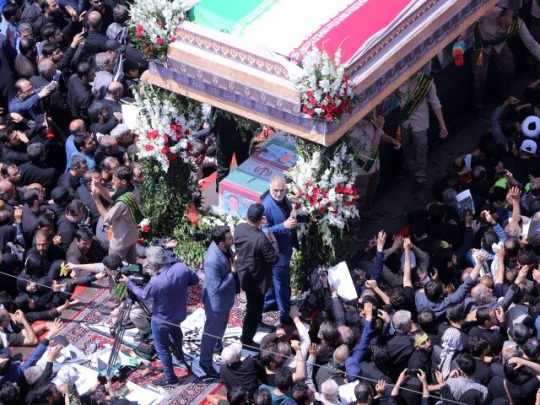
#world news#world politics#news#middle east conflict#middle east news#middle east crisis#middle east war#iran#iran news#iran politics#iranian president#ebrahim raisi#funeral#helicopter#helicopter crash
2 notes
·
View notes
Text
If that’s so then I’d say Erdogan and a few others deserve to be hit with them.
Starting with Assad, sure. His whole ghastly chauvinist regime, right down to his idiot sons.
Ideally followed by Erdogan and Netanyahu (among others).
Speaking of which.
Once again.
Fuck Assad! Him and all his cronies!
#dougie rambles#syria#syrian civil war#news#political crap#war criminals#reblog this#reblog the shit out of this#Suwayda#middle east#levant#protests#war crimes#fuck putin#fuck Erdogan#fuck Assad#fucking hell#fuck netanyahu#fuck isis
5 notes
·
View notes
Text
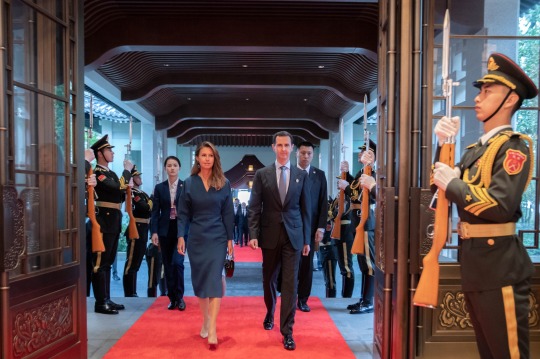
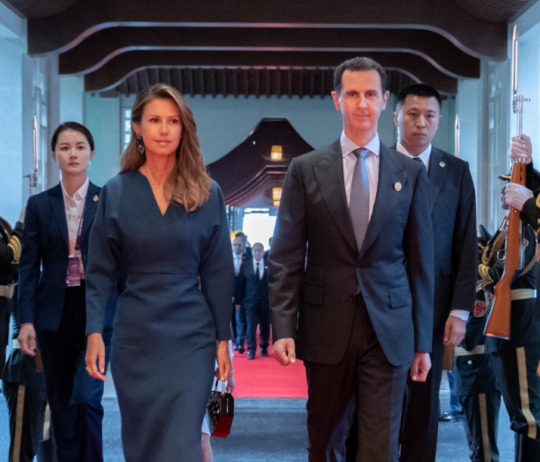
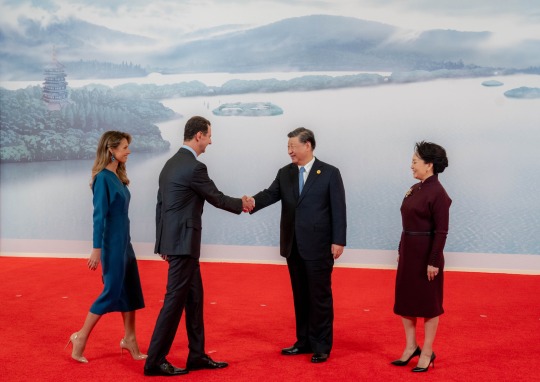
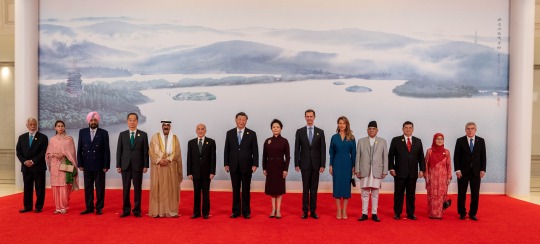

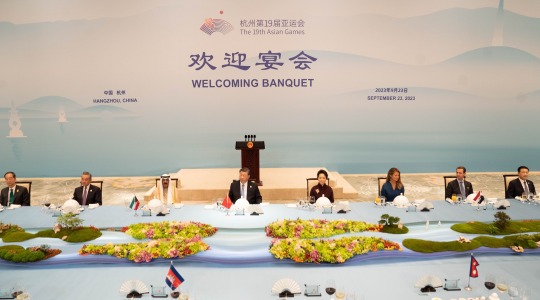
Syrian President Bashar al-Assad and First Lady Asma al-Assad attending the 19th Asian Games banquet in Hangzhou, China, today, 23 September 2023
The opening ceremony for the Asian Games is to be held this evening
#Assad#Bashar al-Assad#Asma al-Assad#Assads#Syria#Xi Jinping#Peng Liyuan#China#Asian Games#19th Asian Games#Hangzhou#Asia
15 notes
·
View notes
Text
how in the fucking world is everyone so focused on i/p that the French government can issue an ARREST WARRANT for Syrian President Bashar al-Assad and it's on like. the second page of Reuters' Middle East news section. Shouldn't that be a front page headline....?
4 notes
·
View notes
Text
Syrian government forces struck areas badly affected by Monday's earthquake shortly after the disaster took place, according to Syrian sources and British politicians.
British MP Alicia Kearns, who chairs the Foreign Affairs Committee, said in a statement on Tuesday that President Bashar al-Assad launched a "truly callous and heinous attack" on Marea, a town in northwestern Syria affected by the earthquake, in the hours after it took place.
A military source stationed near the location confirmed the incident to Middle East Eye, saying there were “no material or human losses.”
"Everyone was preoccupied with the earthquake disaster," he added.
A civilian source said the shelling happened less than two hours after the earthquake, which has so far resulted in the deaths of more than 6,100 people across Turkey and Syria.
17 notes
·
View notes
Text

Syrian President Bashar al-Assad's eldest son graduated on Moscow State University with a degree in mathematics. Congratulations!
7 notes
·
View notes